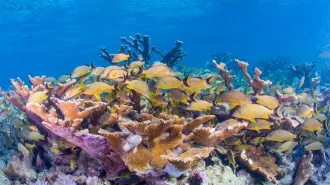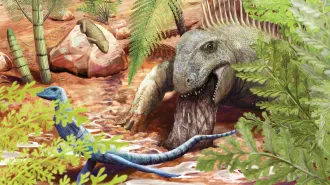Greenhouse gases dissolving in the world’s oceans may have the eerie effect of disrupting young fishes’ natural reluctance to swim toward scary noises.

When raised in water mimicking the predicted acidifying chemistry of future oceans, juvenile clownfish appeared perfectly willing to swim toward speakers broadcasting the recorded daytime sounds of a reef teeming with predators, says fish ecologist Steve Simpson of the University of Bristol in England. “When you’re a centimeter long as a fish, anything is a predator,” he says.
Juvenile orange clownfish (Amphiprion percula) looking for a home on the reef normally spend minimal time near such noises, Simpson explains. Yet youngsters raised in water with conditions predicted for 2050 oceans spent at least half their time in the alarming-noise end of the aquarium, Simpson and his colleagues report in an upcoming Biology Letters.
Changing ocean chemistry is one of the worrisome by-products of the greenhouse gas carbon dioxide billowing into the atmosphere from smokestacks and other orifices of industrial activity. Since the beginning of the Industrial Revolution, roughly 142 billion tons of human-made carbon dioxide has dissolved into the oceans of the world, Simpson says. Adding the gas to seawater creates carbonic acid and is nudging water closer to the acidic end of the basic-acidic (or pH) scale at the fastest pace in 650,000 years.
This pH controls many physiological processes, but only a few have been investigated in terms of acidifying ocean chemistry, says Jean-Pierre Gattuso, a biological oceanographer based in Villefranche-sur-Mer with France’s national research organization, CNRS. He adds, “There is also a dearth of studies looking at the effects of ocean acidification on fish.”
Just what’s causing the fishy nonchalance about dangerous noises is the next question, and it’s a big one. In this experiment, “there is no way to know if the lack of response is related to not hearing, changes in hearing capabilities or anything else about the physiology of the animal,” says Arthur Popper of the University of Maryland in College Park, who has studied fish hearing.
Maybe the fishes’ ear bones, called otoliths, didn’t grow dense enough, muses marine biogeochemist Justin Ries of the University of North Carolina at Chapel Hill. He also notes that acidifying water has been shown to lower the absorption of low-frequency sounds, and this might have an effect on what fish hear.
Simpson and coauthor Philip Munday of James Cook University in Townsville, Australia, doubt that the fish went deaf. The researchers didn’t find abnormally sized or shaped otoliths in the clownfish in the experiment.
Munday’s earlier work has shown that fish exposed to conditions predicted for future oceans display other odd behaviors, such as disinterest in normally attractive odors and extra boldness in leaving hideouts. So both researchers speculate that there may be something more fundamental going wrong that’s causing fish to drop their guard.
Perhaps the fish can hear, but something changes how they choose to respond to cues, Simpson suggests. The fish could be like stressed or desperate individuals of any species that do things they normally wouldn’t.
Or, Munday speculates that chemical changes in the blood and tissues of fish exposed to higher levels of carbon dioxide could influence the function of the nervous system.
Just assuming that species will adapt to future ocean chemistry may not be wise, says Ries. Populations of sensitive species will shrink in the short term, and even if numbers eventually rebound in evolutionary time, “the near-term cost of that evolution could be huge,” he says.







